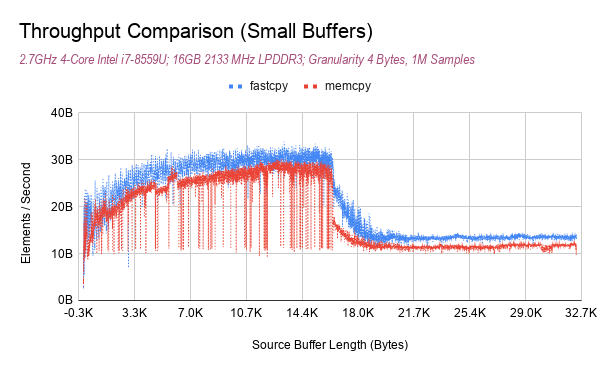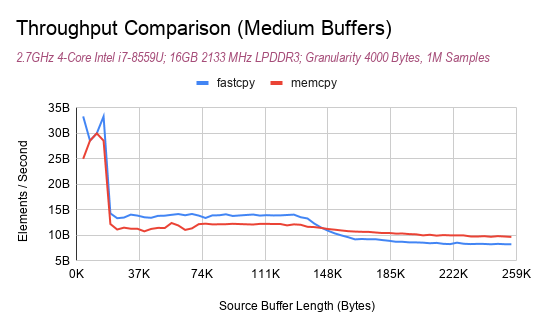A simple, header-only alternative to memcpy, which can be significantly faster depending on copy size.
Example:
#include "fastcpy.h"
// ...
fastcpy((char*)destination, (const char*)input, number_of_bytes);Performance is determined by input buffer size, and on my machine is 2^14 = 16kb:
There is interesting behavior as the input buffer size grows:
It's ultimately up to you to figure out where memcpy would be faster on your target hardware, but the good news is you've got the benchmarking tools, and there's really only one variable to consider: input buffer size.
Writing a simple for loop is faster than memcpy for smaller input sizes. This could be for a number of reasons:
-
The loop can be auto-vectorized by a supporting compiler, if the target architecture provides suitable vector instructions.
- Distributions of the C standard library (where the implementation of
memcpylives) (in my experience) do not include support for vector instructions. This might be for compatibility reasons, or maybe the tradeoff of runtime support and alignment detection doesn't make sense for the standard libraries, who knows. - Distributions of the C standard library may have been compiled using older compilers that leave optimizations on the table, again, who knows.
- Distributions of the C standard library (where the implementation of
-
The compiler has access to all the code you're compiling, with types and annotations. It could in principle perform more sophisticated optimizations with that additional context. The compiler can also do this with shared object files (C standard library) using Link-Time Optimization, but I'm unsure if these are exactly equivalent in the depth of optimization-relevant information available.
Note that when I say the C standard library, I mean the shared object files which contain the actual symbols and machine code which correspond to functions like memcpy.
Benchmark script regrettably requires Node.js:
$ cd benchmarks
$ node profiler.jsThe behavior of the tests (granularity, lower and upper bounds, etc) can be adjusted by editing profiler.js. The results are written as csv to the results directory.
Good luck!

